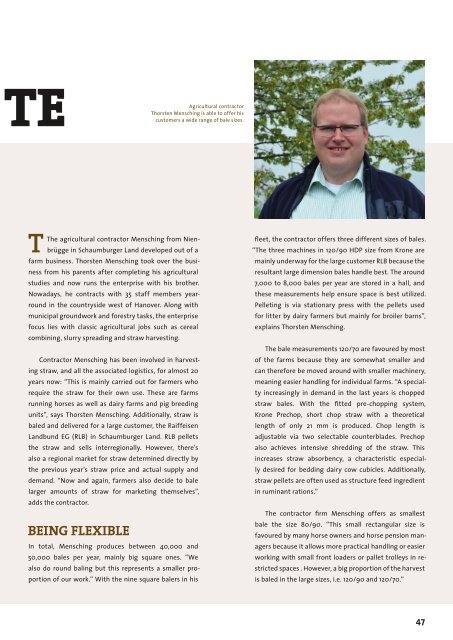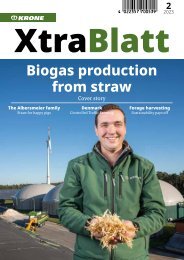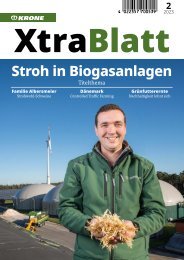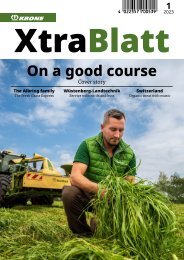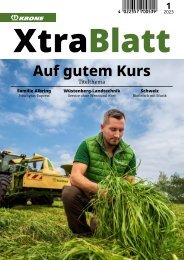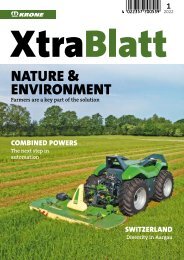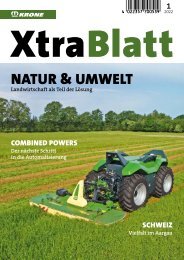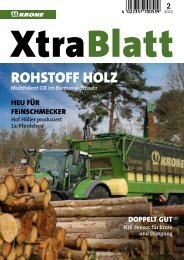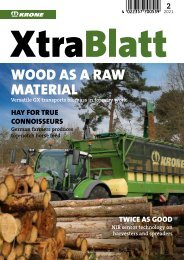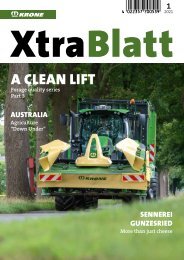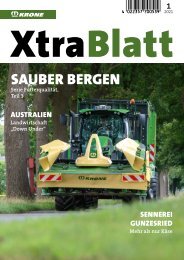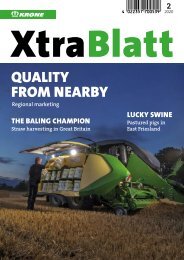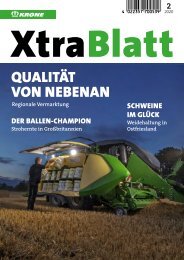XtraBlatt issue 01-2016
Create successful ePaper yourself
Turn your PDF publications into a flip-book with our unique Google optimized e-Paper software.
TE<br />
Agricultural contractor<br />
Thorsten Mensching is able to offer his<br />
customers a wide range of bale sizes.<br />
TThe agricultural contractor Mensching from Nienbrügge<br />
in Schaumburger Land developed out of a<br />
farm business. Thorsten Mensching took over the business<br />
from his parents after completing his agricultural<br />
studies and now runs the enterprise with his brother.<br />
Nowadays, he contracts with 35 staff members yearround<br />
in the countryside west of Hanover. Along with<br />
municipal groundwork and forestry tasks, the enterprise<br />
focus lies with classic agricultural jobs such as cereal<br />
combining, slurry spreading and straw harvesting.<br />
Contractor Mensching has been involved in harvesting<br />
straw, and all the associated logistics, for almost 20<br />
years now: “This is mainly carried out for farmers who<br />
require the straw for their own use. These are farms<br />
running horses as well as dairy farms and pig breeding<br />
units”, says Thorsten Mensching. Additionally, straw is<br />
baled and delivered for a large customer, the Raiffeisen<br />
Landbund EG (RLB) in Schaumburger Land. RLB pellets<br />
the straw and sells interregionally. However, there’s<br />
also a regional market for straw determined directly by<br />
the previous year’s straw price and actual supply and<br />
demand. “Now and again, farmers also decide to bale<br />
larger amounts of straw for marketing themselves”,<br />
adds the contractor.<br />
BEING FLEXIBLE<br />
In total, Mensching produces between 40,000 and<br />
50,000 bales per year, mainly big square ones. “We<br />
also do round baling but this represents a smaller proportion<br />
of our work.” With the nine square balers in his<br />
fleet, the contractor offers three different sizes of bales.<br />
“The three machines in 120/90 HDP size from Krone are<br />
mainly underway for the large customer RLB because the<br />
resultant large dimension bales handle best. The around<br />
7,000 to 8,000 bales per year are stored in a hall, and<br />
these measurements help ensure space is best utilized.<br />
Pelleting is via stationary press with the pellets used<br />
for litter by dairy farmers but mainly for broiler barns”,<br />
explains Thorsten Mensching.<br />
The bale measurements 120/70 are favoured by most<br />
of the farms because they are somewhat smaller and<br />
can therefore be moved around with smaller machinery,<br />
meaning easier handling for individual farms. “A specialty<br />
increasingly in demand in the last years is chopped<br />
straw bales. With the fitted pre-chopping system,<br />
Krone Prechop, short chop straw with a theoretical<br />
length of only 21 mm is produced. Chop length is<br />
adjustable via two selectable counterblades. Prechop<br />
also achieves intensive shredding of the straw. This<br />
increases straw absorbency, a characteristic especially<br />
desired for bedding dairy cow cubicles. Additionally,<br />
straw pellets are often used as structure feed ingredient<br />
in ruminant rations.”<br />
The contractor firm Mensching offers as smallest<br />
bale the size 80/90. “This small rectangular size is<br />
favoured by many horse owners and horse pension managers<br />
because it allows more practical handling or easier<br />
working with small front loaders or pallet trolleys in restricted<br />
spaces . However, a big proportion of the harvest<br />
is baled in the large sizes, i.e. 120/90 and 120/70.”<br />
47


